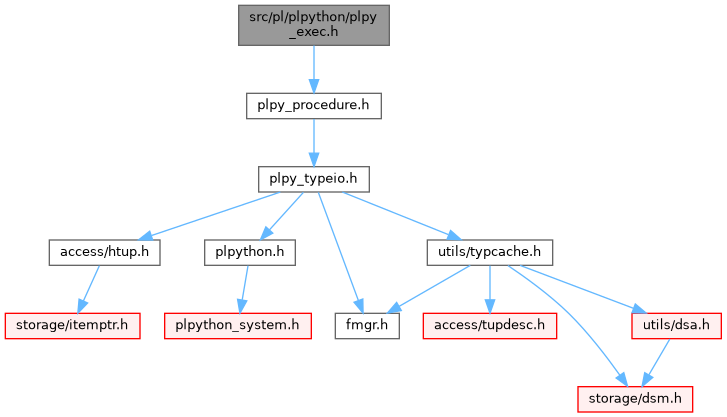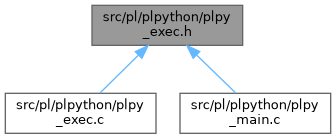#include "plpy_procedure.h"

Go to the source code of this file.
Functions | |
| Datum | PLy_exec_function (FunctionCallInfo fcinfo, PLyProcedure *proc) |
| HeapTuple | PLy_exec_trigger (FunctionCallInfo fcinfo, PLyProcedure *proc) |
| void | PLy_exec_event_trigger (FunctionCallInfo fcinfo, PLyProcedure *proc) |
Function Documentation
◆ PLy_exec_event_trigger()
|
extern |
Definition at line 435 of file plpy_exec.c.
References Assert, CALLED_AS_EVENT_TRIGGER, FunctionCallInfoBaseData::context, elog, ERROR, fb(), GetCommandTagName(), PG_END_TRY, PG_FINALLY, PG_TRY, PLy_elog, PLy_procedure_call(), PLyUnicode_FromString(), SPI_finish(), and SPI_OK_FINISH.
Referenced by plpython3_call_handler().
◆ PLy_exec_function()
|
extern |
Definition at line 54 of file plpy_exec.c.
References ReturnSetInfo::allowedModes, Assert, elog, ereport, errcode(), errdetail(), errmsg(), ERROR, error_context_stack, fb(), get_call_result_type(), PLyProcedure::is_procedure, PLyProcedure::is_setof, IsA, FunctionCallInfoBaseData::isnull, MemoryContextAllocZero(), MemoryContextRegisterResetCallback(), PG_CATCH, PG_END_TRY, PG_RE_THROW, PG_TRY, plpython_return_error_callback(), plpython_srf_cleanup_callback(), PLy_elog, PLy_function_build_args(), PLy_function_drop_args(), PLy_function_restore_args(), PLy_function_save_args(), PLy_global_args_pop(), PLy_global_args_push(), PLy_output_convert(), PLy_output_setup_record(), PLy_procedure_call(), ErrorContextCallback::previous, PLyProcedure::result, FunctionCallInfoBaseData::resultinfo, ReturnSetInfo::returnMode, SFRM_ValuePerCall, SPI_finish(), SPI_OK_FINISH, SRF_FIRSTCALL_INIT, SRF_IS_FIRSTCALL, SRF_PERCALL_SETUP, SRF_RETURN_DONE, SRF_RETURN_NEXT, SRF_RETURN_NEXT_NULL, TYPEFUNC_COMPOSITE, and PLyObToDatum::typoid.
Referenced by plpython3_call_handler(), and plpython3_inline_handler().
◆ PLy_exec_trigger()
|
extern |
Definition at line 320 of file plpy_exec.c.
References Assert, CALLED_AS_TRIGGER, FunctionCallInfoBaseData::context, elog, ereport, errcode(), errdetail(), errmsg(), ERROR, fb(), PLyProcedure::mcxt, PG_END_TRY, PG_FINALLY, pg_strcasecmp(), PG_TRY, PG_USED_FOR_ASSERTS_ONLY, PLy_global_args_pop(), PLy_global_args_push(), PLy_input_setup_func(), PLy_input_setup_tuple(), PLy_modify_tuple(), PLy_output_setup_func(), PLy_output_setup_tuple(), PLy_procedure_call(), PLy_trigger_build_args(), PLyUnicode_AsString(), RelationGetDescr, PLyProcedure::result, PLyProcedure::result_in, SPI_finish(), SPI_OK_FINISH, SPI_register_trigger_data(), TRIGGER_FIRED_BY_INSERT, TRIGGER_FIRED_BY_UPDATE, PLyDatumToOb::typoid, PLyObToDatum::typoid, and WARNING.
Referenced by plpython3_call_handler().